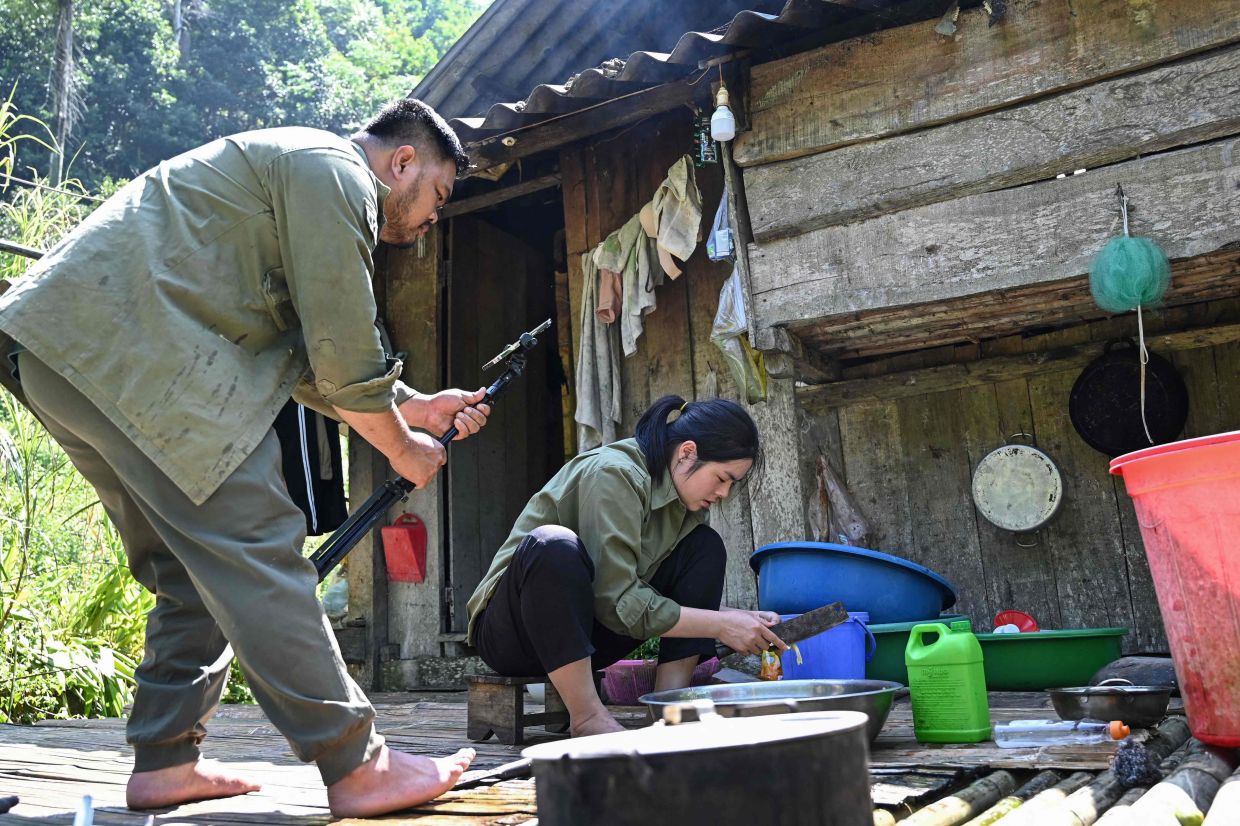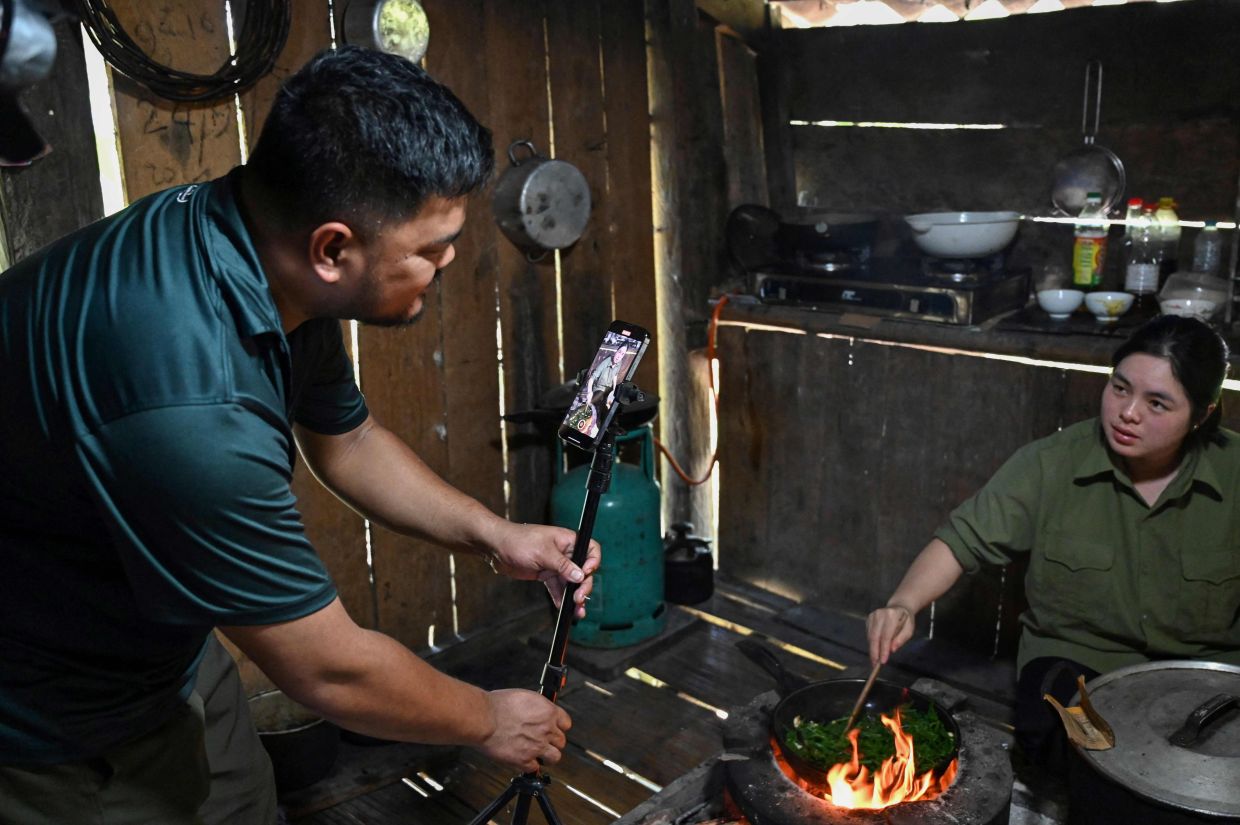A mobile phone being used to shoot a TikTok video of TikToker Vi Thi Anh sorting out noodles at her workshop in Bac Giang province. Anh spent half a decade doing monotonous low-paid work in an industrial hub near Vietnam’s capital Hanoi, assembling mobile phones for global electronics companies including Samsung. Then she discovered she could earn vastly more hawking food products to thousands of followers as one of Vietnam's growing cadre of TikTok livestreamers. — AFP
BAC GIANG, Vietnam: Vi Thi Anh spent half a decade doing monotonous low-paid work in industrial hubs near Vietnam’s capital Hanoi, assembling mobile phones for global electronics companies including Samsung.
Then she discovered she could earn vastly more hawking food products to thousands of followers as one of the country’s growing cadre of TikTok livestreamers.
Communist Vietnam’s supply of cheap labour has attracted some of the world’s top companies, but climbing salary expectations have enticed many young people to leap into the exploding business of social commerce – whether to boost their incomes or to extricate themselves from dead-end jobs.
Anh, 23, said she earned just US$400 (RM1,866) per month in her “boring” factory job, barely enough to cover her rent and food, before she was laid off in 2021 thanks to falling orders from the West.
She found another factory job, but soon “turned to full-time livestreaming so I could earn more for my family”, Anh told AFP, the thick rice noodles she sells online laid out behind her, drying in the sun.
On her TikTok channel, which has over 350,000 followers and 15 million likes, orders fly in for the US$4 (RM18) noodle packs, made by her uncle.
“This pack of noodles is so colourful, but completely safe and delicious,” Anh tells her audience, pointing to red, yellow and purple bundles.
Between June and September this year, more than 118,000 people, mostly in the garment and footwear sector, lost their jobs in Vietnam, according to official figures.
At her home in northern Bac Giang province, Anh said that like she did, workers fear “that if they are laid off, they have no way of earning a living”.
Livestreaming, she said, offers a way to ease that worry.
Booming ecommmerce
Nearly 80% of Vietnam’s 100 million people have access to the Internet, and according to a recent survey by the data agency Statista, a similarly high percentage of Gen Z use TikTok.
“Farmers, workers and students can easily start their own channels,” said Nguyen Doan Ky, co-founder of the DC 3 Do agency, which offers social media and livestreaming services.
“Online selling used to be only for businesses or shop owners. Now it is an opportunity for everyone.”
As in neighbouring China, where farmers are making big money on TikTok, ecommerce is booming in Vietnam, with sales growth averaging 30% year over year for the last decade.
Vietnam is one of the world’s top 10 growth markets and turnover is expected to reach more than US$20bil (RM93.31bil) this year, according to the ministry of industry and trade.
Coming from the country’s rural and mountainous north, Luong Quang Dai never imagined he would become an influencer with 420,000 followers online.
He earns 10 times as much as he did before livestreaming thanks to his popularity on Tiktok and Facebook, selling dried bananas, vermicelli noodles and a tea mix made in his neighbourhood.
“We can save up to 100 million dong per month (RM19,241) and at the same time help create jobs and a stable income for relatives and friends,” the 33-year-old told AFP from his farmhouse in the forests of Bac Kan province.
In his youth, Dai spent two years trying to find a route out of the hard, spare life of a farmer, moving to the city in a familiar story of urban migration.
But failing to earn enough for even basic necessities, he returned to his home in the countryside, where two-thirds of Vietnamese still live.
In addition to farming, he began to post videos on social media of him and his wife feeding chickens and harvesting bamboo in the depths of the forest.
The simplicity of the posts soon earned him an enormous following, and he began to sell his produce in huge quantities.
“Social media has changed my life completely,” Dai told AFP.
‘Digital farmer’
Tran Thanh Nam, an education psychology expert, cautioned that although social commerce has become popular, TikTokers needed to keep updating their skill sets.
“Businesses that take off in a short space of time... can also turn into failures quickly,” he said.
But he understood the appeal, he added.
“Becoming a worker in a factory or industrial zone is a way to use up all one’s youth and health... and they lose a lot of other opportunities.”
According to state media, on TikTok alone there were 30 training programmes on digital transformation that attracted thousands of learners in 2022.
Among other blue-collar workers to have found an audience and a decent income is Loc Fuho – a former builder with 2.5 million followers who livestreams lessons in masonry and plastering.
Dai is still happy to be a farmer, “but a digital one”, who has influence and a good income.
“I expect nothing more,” Dai said. – AFP












